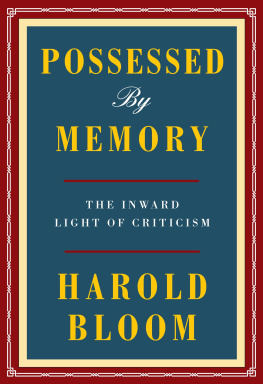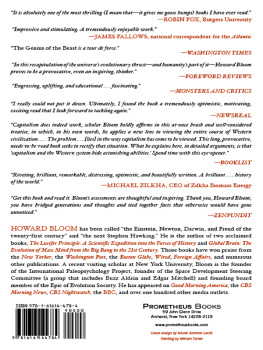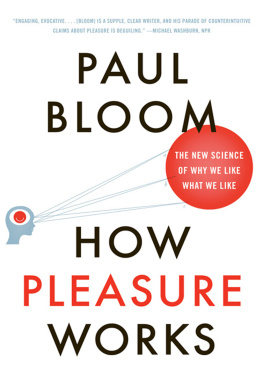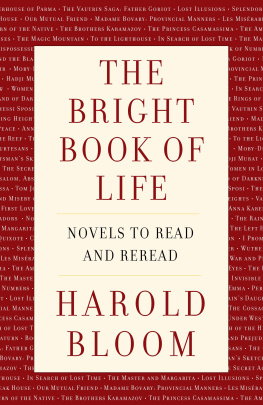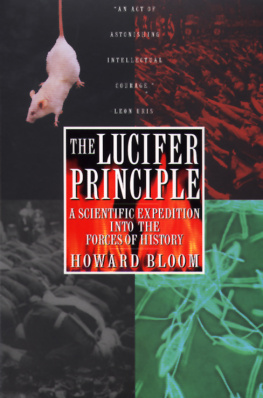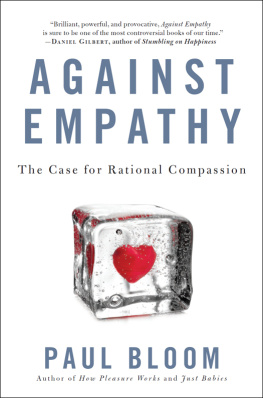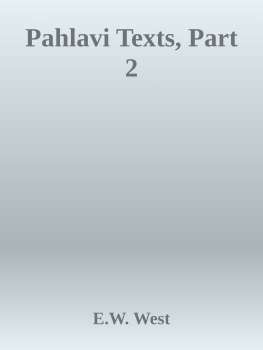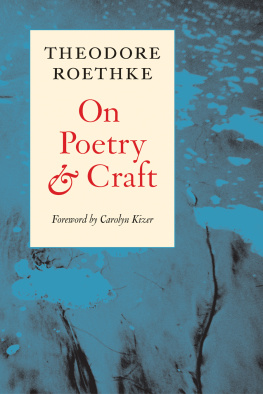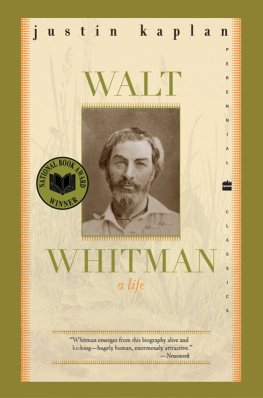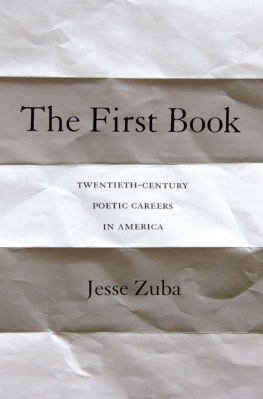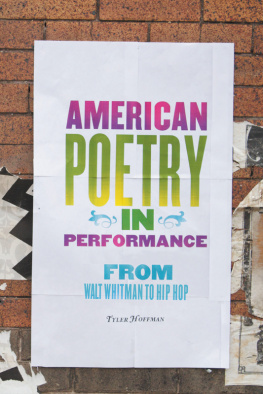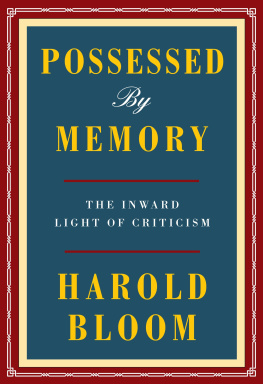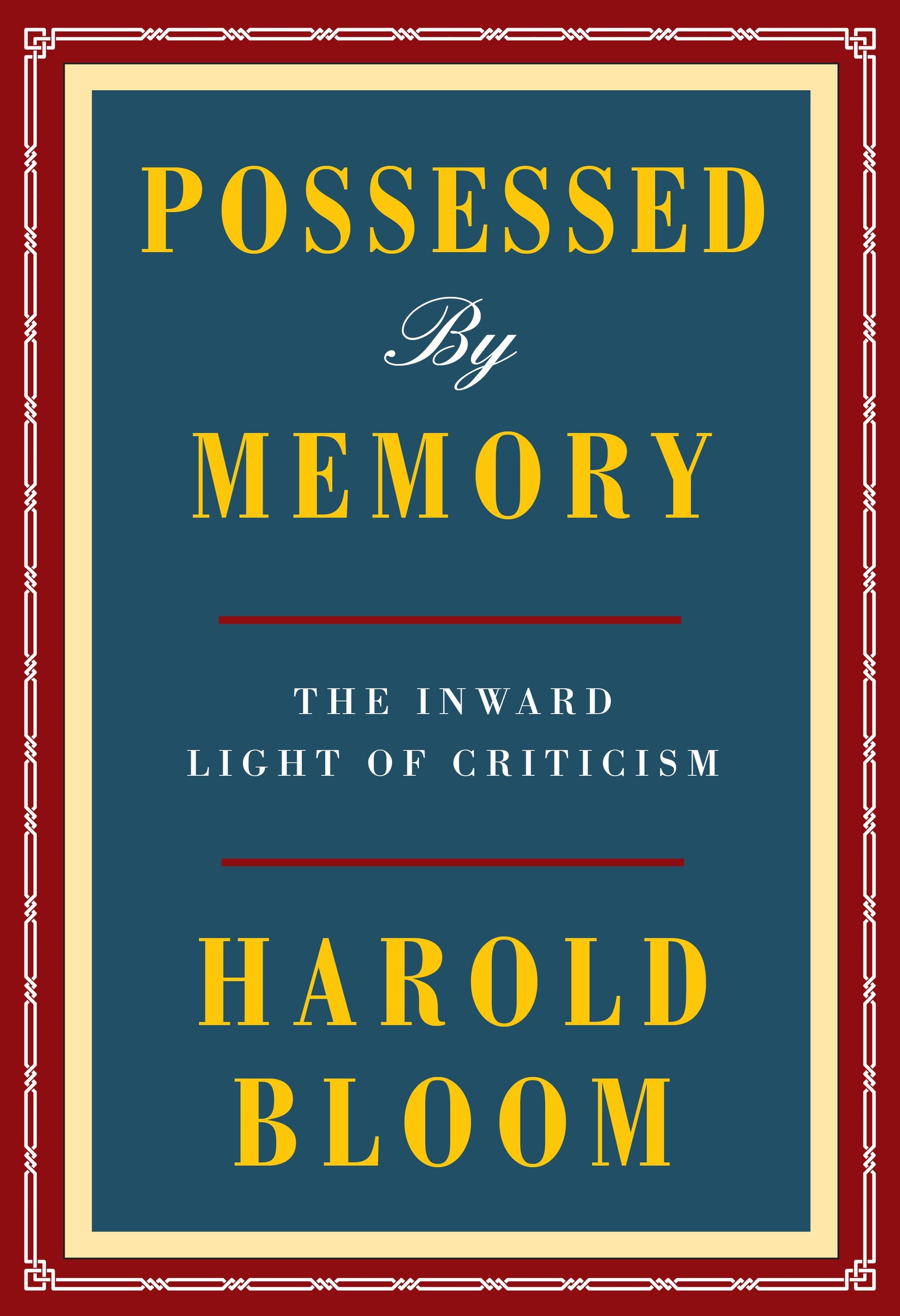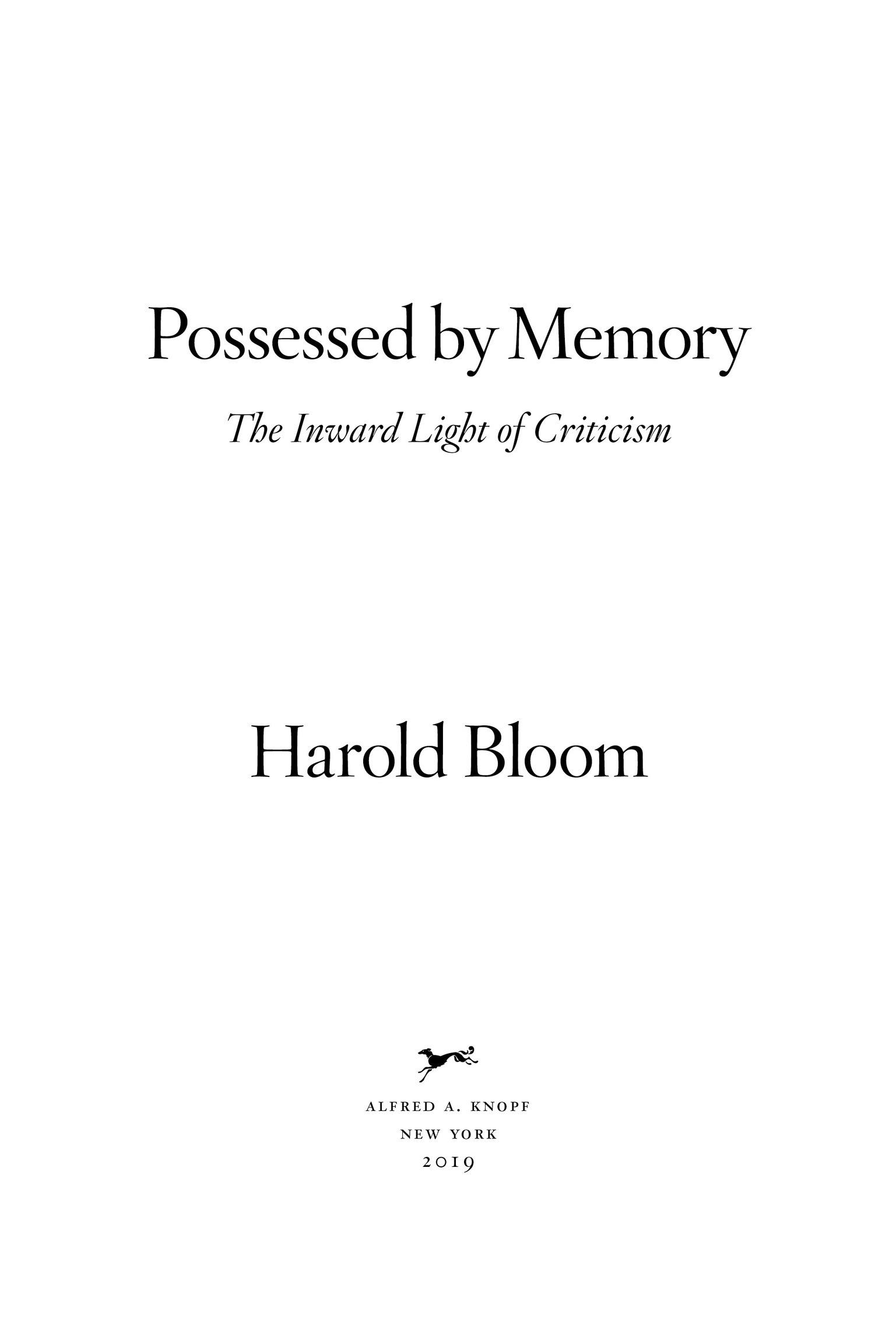ALSO BY HAROLD BLOOM
Macbeth: A Dagger of the Mind
Iago: The Strategies of Evil
Lear: The Great Image of Authority
Cleopatra: I Am Fire and Air
Falstaff: Give Me Life
The Daemon Knows: Literary Greatness and the American Sublime
The Shadow of a Great Rock: A Literary Appreciation of the King James Bible
The Anatomy of Influence: Literature as a Way of Life
Till I End My Song: A Gathering of Last Poems
Fallen Angels
American Religious Poems: An Anthology
Jesus and Yahweh: The Names Divine
Where Shall Wisdom Be Found?
The Best Poems of the English Language: From Chaucer Through Frost
Hamlet: Poem Unlimited
Genius: A Mosaic of One Hundred Exemplary Creative Minds
Stories and Poems for Extremely Intelligent Children of All Ages
How to Read and Why
Shakespeare: The Invention of the Human
Omens of Millennium: The Gnosis of Angels, Dreams, and Resurrection
The Western Canon: The Books and School of the Ages
The American Religion: The Emergence of the Post-Christian Nation
The Book of J
Ruin the Sacred Truths: Poetry and Belief from the Bible to the Present
The Poetics of Influence: New and Selected Criticism
The Breaking of the Vessels
The Strong Light of the Canonical
Agon: Towards a Theory of Revisionism
The Flight to Lucifer: A Gnostic Fantasy
Deconstruction and Criticism
Wallace Stevens: The Poems of Our Climate
Figures of Capable Imagination
Poetry and Repression: Revisionism from Blake to Stevens
Kabbalah and Criticism
A Map of Misreading
The Anxiety of Influence: A Theory of Poetry
The Ringers in the Tower: Studies in Romantic Tradition
Yeats
Romanticism and Consciousness
Commentary on David V. Endmans Edition of The Poetry of William Blake
Selected Writings of Walter Pater
The Literary Criticism of John Ruskin
Blakes Apocalypse: A Study in Poetic Argument
The Visionary Company: A Reading of English Romantic Poetry
Shelleys Mythmaking
THIS IS A BORZOI BOOK
PUBLISHED BY ALFRED A. KNOPF
Copyright 2019 by Harold Bloom
All rights reserved. Published in the United States by Alfred A. Knopf, a division of Penguin Random House LLC, New York, and distributed in Canada by Random House of Canada, a division of Penguin Random House Canada Limited, Toronto.
www.aaknopf.com
Knopf, Borzoi Books, and the colophon are registered trademarks of Penguin Random House LLC.
Library of Congress Cataloging-in-Publication Data
Names: Bloom, Harold, author.
Title: Possessed by memory : the inward light of criticism / Harold Bloom.
Description: First edition. | New York : Alfred A. Knopf, 2019. | Includes bibliographical references.
Identifiers: LCCN 2018037649 (print) | LCCN 2019001822 (ebook) | ISBN 9780525520894 (ebook) | ISBN 9780525520887 (hardcover)
Subjects: LCSH : LiteratureHistory and criticism. | Canon (Literature) | Bloom, HaroldBooks and reading.
Classification: LCC PN 511 (ebook) | LCC PN 511 . B 525 2019 (print) | DDC 809dc23
LC record available at https://lccn.loc.gov/2018037649
Ebook ISBN9780525520894
Cover design by Chip Kidd
v5.4
ep
For Celina Spiegel
That is what the highest criticism really is, the record of ones own soul. It is more fascinating than history, as it is concerned simply with oneself. It is more delightful than philosophy, as its subject is concrete and not abstract, real and not vague. It is the only civilised form of autobiography, as it deals not with the events, but with the thoughts of ones life; not with lifes physical accidents of deed or circumstance, but with the spiritual moods and imaginative passions of the mind.
OSCAR WILDE, The Critic as Artist, Intentions (1891)
Contents
I am grateful for the labors of my editor and publisher, Erroll McDonald, and his assistant, Nicholas Thomson, and production editor, Victoria Pearson. As always, I am indebted to my literary agents, Glen Hartley and Lynn Chu.
This book would not exist without the devoted efforts of my research assistants: Lauren Smith, Alice Kenney, Jessica Branch, Bethany Carlson, Alexis Larsson, Abigail Storch, and Natalie Rose Schwartz.
Authors Note
All Bible excerpts are from the King James Bible, unless otherwise noted in the text. Excerpts from Shakespeare tend to follow the latest Arden edition. I have in a few places repunctuated according to my understanding of the text and restored Shakespeares language, where I judge traditional emendations to be mistaken.
Preface
MANY YEARS AGO, in Cambridge, England, I attended one meeting of a rather esoteric faculty group that believed you could communicate with the dead. It was a disquieting experience with a gyrating table and spirit voices drifting in. I left, rather abruptly, because I felt out of place. Long before that, my charming mentor George Wilson Knight attempted to persuade me of his conviction that sances were authentic. I recall protesting that this seemed to me an over-literalization of a human yearning. George chuckled and said I was still too young to comprehend a vital truth.
The poet James Merrill, a good acquaintance, sometimes teased me about my skepticism. Like William Butler Yeats, he called up spooks to give him metaphors for poetry. With both poets, the results were wonderful, whether or not sprites aided the imaginings.
My own concern is rather different. When I read my departed friends, I have an uncanny sensation that they are in the room. Common readers, so many of whom are in touch with me, are very moving when they say that reading or rereading a book highly valued by their beloved dead comforts them.
All of us wish that, when we experience sorrow, we could be shown the end of sorrow. If we are secular, that cannot be expected. Possessed by Memory is not intended to be a lamentation for my own generation of critics and poets. Instead it hopes, in part, to be a living tribute to their afterlife in their writings. The other evening, I glanced at my writing table and saw books by many of my lost friends. There were volumes of poetry by John Ashbery, A. R. Ammons, Mark Strand, Alvin Feinman, and of criticism by Richard Rorty, Geoffrey Hartman, Angus Fletcher, and John Hollander. I had been close to all of them for at least half a century, and to most of them for two-thirds of my lifetime.
I will be going on eighty-nine when this book is published; in its composition over the past several years I began to apprehend my ongoing writing as a dialogue with my dead friends. These include mentors like M. H. Abrams, Frederick Pottle, Gershom Scholem, Hans Jonas, and Kenneth Burke. Sometimes they were good acquaintances: Frank Kermode, Anthony Burgess, A. D. Nuttall, Northrop Frye.
This book is reverie and not argument. My title is the book in a single phrase. What is it to be possessed by memory? How does possession differ in these: to possess dead or lost friends and lovers, or to possess poetry and heightened prose by memory? The range of meanings of the verb possess are varied: to own as property, to have power over, to master knowledge, to be controlled by a daemon, to be filled with felt experience or with cognitive apprehension, to enjoy sexual intercourse, to usurp and pillage.

